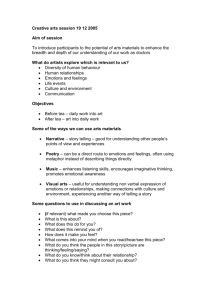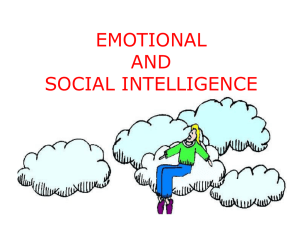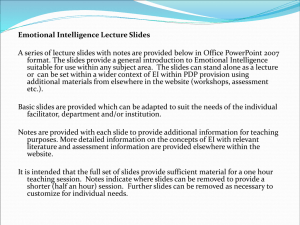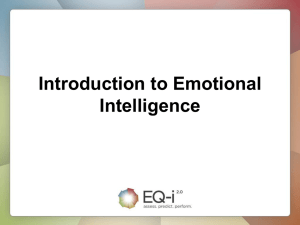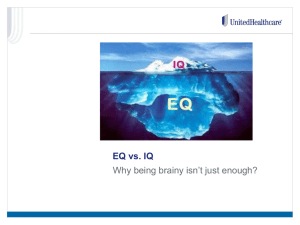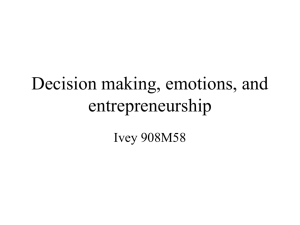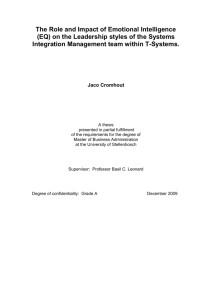Introducing emotional intelligence in schools?
advertisement
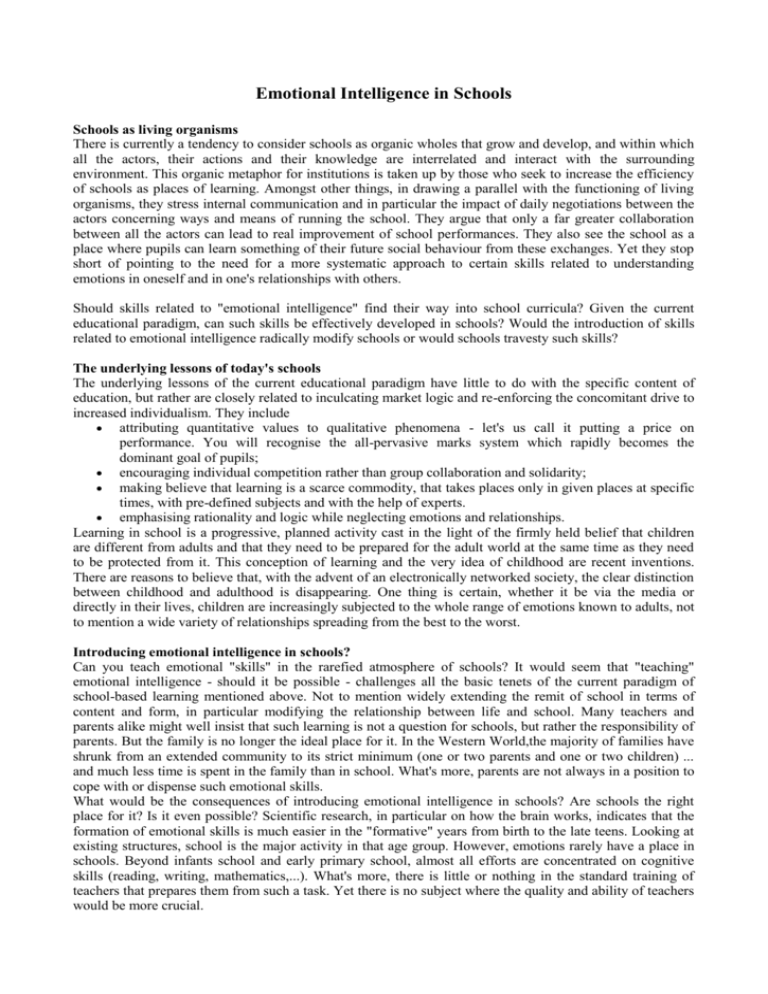
Emotional Intelligence in Schools Schools as living organisms There is currently a tendency to consider schools as organic wholes that grow and develop, and within which all the actors, their actions and their knowledge are interrelated and interact with the surrounding environment. This organic metaphor for institutions is taken up by those who seek to increase the efficiency of schools as places of learning. Amongst other things, in drawing a parallel with the functioning of living organisms, they stress internal communication and in particular the impact of daily negotiations between the actors concerning ways and means of running the school. They argue that only a far greater collaboration between all the actors can lead to real improvement of school performances. They also see the school as a place where pupils can learn something of their future social behaviour from these exchanges. Yet they stop short of pointing to the need for a more systematic approach to certain skills related to understanding emotions in oneself and in one's relationships with others. Should skills related to "emotional intelligence" find their way into school curricula? Given the current educational paradigm, can such skills be effectively developed in schools? Would the introduction of skills related to emotional intelligence radically modify schools or would schools travesty such skills? The underlying lessons of today's schools The underlying lessons of the current educational paradigm have little to do with the specific content of education, but rather are closely related to inculcating market logic and re-enforcing the concomitant drive to increased individualism. They include attributing quantitative values to qualitative phenomena - let's us call it putting a price on performance. You will recognise the all-pervasive marks system which rapidly becomes the dominant goal of pupils; encouraging individual competition rather than group collaboration and solidarity; making believe that learning is a scarce commodity, that takes places only in given places at specific times, with pre-defined subjects and with the help of experts. emphasising rationality and logic while neglecting emotions and relationships. Learning in school is a progressive, planned activity cast in the light of the firmly held belief that children are different from adults and that they need to be prepared for the adult world at the same time as they need to be protected from it. This conception of learning and the very idea of childhood are recent inventions. There are reasons to believe that, with the advent of an electronically networked society, the clear distinction between childhood and adulthood is disappearing. One thing is certain, whether it be via the media or directly in their lives, children are increasingly subjected to the whole range of emotions known to adults, not to mention a wide variety of relationships spreading from the best to the worst. Introducing emotional intelligence in schools? Can you teach emotional "skills" in the rarefied atmosphere of schools? It would seem that "teaching" emotional intelligence - should it be possible - challenges all the basic tenets of the current paradigm of school-based learning mentioned above. Not to mention widely extending the remit of school in terms of content and form, in particular modifying the relationship between life and school. Many teachers and parents alike might well insist that such learning is not a question for schools, but rather the responsibility of parents. But the family is no longer the ideal place for it. In the Western World,the majority of families have shrunk from an extended community to its strict minimum (one or two parents and one or two children) ... and much less time is spent in the family than in school. What's more, parents are not always in a position to cope with or dispense such emotional skills. What would be the consequences of introducing emotional intelligence in schools? Are schools the right place for it? Is it even possible? Scientific research, in particular on how the brain works, indicates that the formation of emotional skills is much easier in the "formative" years from birth to the late teens. Looking at existing structures, school is the major activity in that age group. However, emotions rarely have a place in schools. Beyond infants school and early primary school, almost all efforts are concentrated on cognitive skills (reading, writing, mathematics,...). What's more, there is little or nothing in the standard training of teachers that prepares them from such a task. Yet there is no subject where the quality and ability of teachers would be more crucial. Introducing emotions in schools would be a radical change! Yet schools do not change so readily. Those well-meaning people who have tried to introduce innovations in schools have come up against considerable resistance from teachers, students and parents alike. Yet without their active participation, no such farreaching change is possible. One possible solution, if such essential skills prove too difficult to develop in schools, would be to start by introducing them in the spaces around school. During the breaks for example. Daniel Goleman describes how appointed pupil mediators, once all involved know the rules of the game, resolve conflicts in the playground. Such a "school for emotions" could be a local, community-based activity in conjunction with other activities like scouts, parent-teachers associations, artistic expression groups, clubs etc. What skills? But what exactly might such skills be? In his book, Daniel Goleman gives a considerable list. Here are some indications. Self awareness One of the basic emotional skills involves being able to recognise feelings and put a name on them. It is also important to be aware of the relationship between thoughts, feelings and actions. What thought sparked off that feeling? What feeling was behind that action? Managing emotions It is important to realise what is behind feelings. Beliefs have a fundamental effect on the ability to act and on how things are done. Many people continually give themselves negative messages. Hope can be a useful asset. In addition, finding ways to deal with anger, fear, anxiety and sadness is essential: learning how to soothe oneself when upset, for example. Understanding what happens when emotions get the upper hand and how to gain time to judge if what is about to be said or done in the heat of the moment is really the best thing to do. Being able to channel emotions to a positive end is a key aptitude. Empathy Getting the measure of a situation and being able to act appropriately requires understanding the feelings of the others involved and being able to take their perspective. It is important to be able to listen to them without being carried away by personal emotions. There's a need to be able to distinguish between what others do or say and personal reactions and judgements. Communicating Developing quality relationships has a very positive effect on all involved. What feelings are being communicated to others? Enthusiasm and optimism are contagious as are pessimism and negativity. Being able to express personal concerns without anger or passivity is a key asset. Co-operation Knowing how and when to take the lead and when to follow is essential for effective co-operation. Effective leadership is not built on domination but the art of helping people work together on common goals. Recognising the value of the contribution of others and encouraging their participation can often do more good than giving orders or complaining. At the same time, there is a need to take responsibilities and recognise the consequences of decisions and acts and follow through on commitments. Resolving conflicts In resolving conflicts there is a need to understand the mechanisms at work. People in conflict are generally locked into a self-perpetuating emotional spiral in which the declared subject of conflict is rarely the key issue. Much of the resolution of conflicts calls on using the other emotional skills mentioned here. Self Science: The Subject is Me (2nd edition) by Karen Stone McCown et al. [San Mateo, Six Seconds, 2003]
